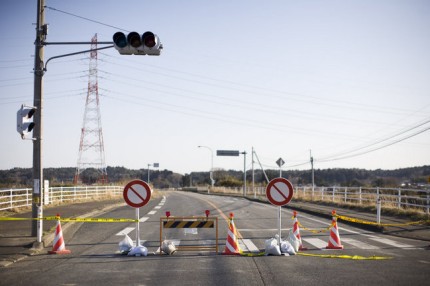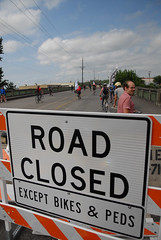
(Photo: Motoya Nakamura/The Oregonian)
“A community that has the human and physical infrastructure to support transportation methods other than cars would almost by definition be more resilient than one that is reliant on cars.”
— Joe Partridge, Deputy for Planning and Preparedness for Multnomah County
When disaster struck Japan two months ago, the power of the earthquake and the devastating tsunami that followed crumpled many roads in the affected areas. As people tried to resume their lives, one bright spot (at least to observers from afar) was that the humble bicycle emerged as a vital tool to help people and goods move around on roads where cars were useless.
Following the disaster, bicycle sales boomed, and even the New York Times noted the “burst of enthusiasm for bicycling.”
Yesterday we read in The Oregonian, that experts think a similar disaster could befall the Pacific Northwest.
When disaster strikes here in Portland; what role will bicycles play? After all, we have not only the largest percentage of regular bike riders of any big city in America, we’re deep when it comes to cyclocross talent (for those hard to pass roads), and we’ve got a flourishing cargo bike scene.
That article in The O paints a dire picture. One consultant is quoted as saying, “The majority of our transportation system will be crippled.” Another adds that, “Oregonians could reduce impacts by bolting houses to foundations, assembling emergency kits and buying non-sparking wrenches for turning off natural gas.”
Should we add a tuned-up bicycle to those emergency kits?
Looking for some perspective on this, I asked Joe Partridge, Multnomah County’s Deputy for Planning and Preparedness (who also happens to be a bike racer and all-around bike fan).
Does our transportation network figure into the county’s disaster plans?
There are many different kinds of disasters and they effect the transportation network in different ways. Clearing debris from roadways is critical in many disasters; it is necessary for both first-responders and residents to get where they need to go and to deliver disaster relief supplies. Bridges are also an important part of the transportation network in our area. Many people live and work on opposite sides of the river; damage to bridges would complicate relief and response operations.

cyclocross skills to use if necessary.
When I mentioned the potential role of bicycles in an email recently, you referred to them as “alternative evacuators.” What did you mean by that?
Hmmm, I think I might have coined that term on the fly. I was thinking about people that would choose to evacuate by a method other than automobile. Much of the community evacuation guidance I have seen from the federal government assumes people prefer to evacuate by car. You can see [from that FEMA link] that the assumption is that if you can’t drive, you have to rely on government (or family) to help you.
We know that there are many people in and around Portland that lead a car-free lifestyle not out of need but instead because it is their desired mode of travel. It makes sense to me that some of these people would choose to evacuate by bicycle in the event of a disaster.
Do you think Portland being such a bike-centric city will help it deal with major disaster that compromises the road network?
It’s hard to say. The type of disaster prompting the evacuation and the time of year would have a significant effect on the number of people that would choose to evacuate by bike. I think for small scale and short duration evacuations, the use of a bicycle (or walking!) could be a great option. For a large-scale disaster during inclement weather requiring a long-distance evacuation, I think fewer people would be willing or able to evacuate by bike.
In your professional opinion, do you think a city where bikes are common will be more resilient in the face of a disaster that compromises transportation networks?
Yes! A community that has the human and physical infrastructure to support transportation methods other than cars would almost by definition be more resilient than one that is reliant on cars. The ability to move people and goods without the use of fossil fuel (which could be in limited supply during and after a disaster) would increase the resiliency of a community.
So there you have it folks. If you haven’t already, make sure bicycles are part of your emergency preparedness kit.
— Further reading: The San Francisco Chronicle’s bike blog published a story about bikes and disasters today too!


